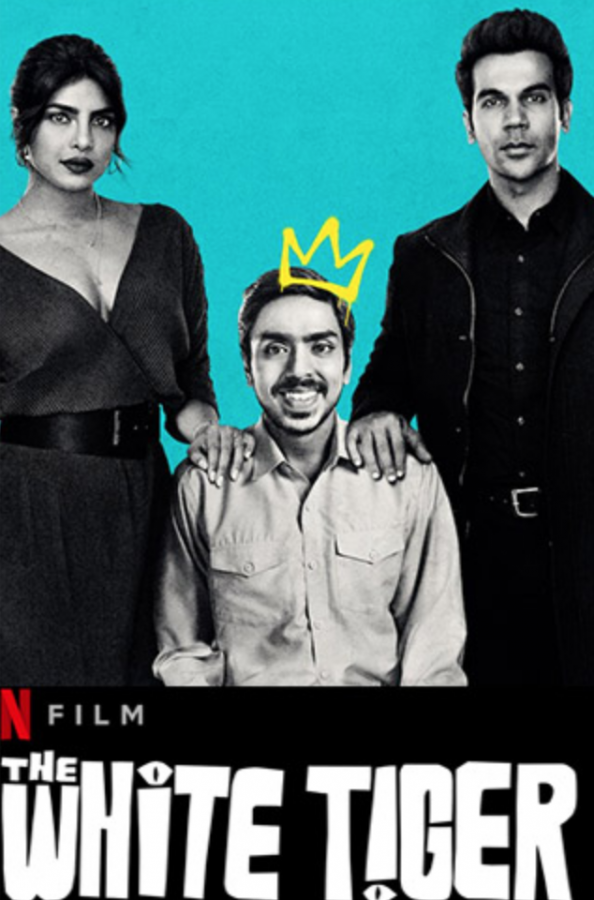The White Tiger – Film Review
April 30, 2021
Directed and Produced by Ramin Bahrani
Adarsh Gourav who is an assessment of The White Tiger who is terrifying and poignant as the character he played, Balram Halwai, the upwardly mobile driver in the film. Balram is fiercely smart, vengeful and filled with a seething rage, that he camouflages with an overtly servile manner. With more education and opportunities, he could have run the country. But when you are a lower-caste boy from a large, poor family in rural India, both are in short supply. Balram is born into what he calls the darkness, but he wills his way into turning into something like light. Balram does terrible things to get ahead. Like in reference to the Kim family in Bong-Joon Ho’s Oscar-winning Parasite, he goes about his dastardly deeds without drama or conscience. For him, the choices he makes are the only ones he has. Adarsh is electrifying as Balram. He inhabits every infection of the character. From his slouching shoulders, as though generations of being subservient has modeled even his body language, to his shifty gaze, to his superbly honed survival instinct, to his cunning and cruelty, to his keen understanding of his own tragedy – of having a mind that supersedes his station. Adarsh delivers a sensational performance, which propels the film.
The White Tiger is a film adaptation of Aravind Adiga’s 2008 Booker Prize-winning novel. The novel is dedicated to Iranian-American director Ramin Bahrani. So it’s fitting that it has been reworked for the screen by him. It’s also fitting because in his nearly two-decade-long career, Bahrani’s cinema has consistently searched for poetry in the ordinary. His characters live lives of quiet desperation. Think of Man Push Cart, Chop Shop, or 99 Homes.
Adiga’s novel is a savage exploration of the horrors of globalized India. The book is narrated in first-person by Balram whose sharp, serrated voice slices like a cleaver through meat. Bahrain retains that, with Balram taking us through his story, which is narrated through emails, that Balram is writing to a Chinese premier visiting the country. Like the book, the film will make you squirm. There is no respite here from the horrors of oppression, corruption, entitlement, greed, and the casual nastinees with which those with money treat those without it. Bahrani consistently underlines the contrasts. Balram’s masters – Ashok and Pinky – live in a lush apartment with shiny marble and chandeliers. In the same building complex, Balram and the other drivers live in the dingy basement. Balram sleeps under a mosquito net, which also keeps the swarming cockroaches at bay. They crawl above him as though they were higher in the food chain. It is as though New Delhi is a modern-day version of the city in Fritz Lang’s science-fiction classic Metropolis, where the rich live in towering skyscrapers, while the poor toil underneath. Balram, who thinks of himself as a once in a generation white tiger, desperately wants to break out, of which he calls the ‘rooster coop’. Balram isn’t the only one resisting his fate. Despite their affluence, Ashok and Pinky are also trapped. Ashok’s overbearing landlord father, who Balram calls the stork and his brother, the mongoose, and the ones yanking the strings. But they are too hustling to curry favor with the powerful chief minister only known as The Great Socialist, played by a solid Swaroop Sampat. The jungle metaphor runs through the story, from the title to Divine’s throbbing Jungle Mantra song, which plays at the end. Lawlessness permeates every aspect of life, including the traffic. Early in the film, a driving teacher tells Balram, ‘Sadak ek jungle hai.’ But finally, it is the sadak where Balram finds his freedom.
The White Tiger is in equal parts, dazzling, funny and brutal. For much of the film, Bahrani sustains a boisterous energy with brisk editing, pungent dialogue, and striking images by DoP Paolo Carnera. One of the highlights is Kamlesh Gill as Balram’s awful, blood-sucking grandmother. In this jungle, even the great Indian family becomes a predator. Granny is Balram’s first nemesis.
Priyanka Chopra-Jonas, who’s also executive producer, is nicely understated as the Indian-American Pinky, who at least attempts to treat Balram as a human being. But Rajkumar Rao never finds his bearings as Ashok. The usually terrific actor is saddled with a clumsy accent and clumsier dialogue. Ashok has recently moved from the US to India. We aren’t told how long he was abroad, but he says lines like: ‘Why does this caste matter?’ or ‘In America they could sue you for that.’ Neither Bahrani, who’s written the film nor Rajkumar are able to make Ashok convincing.
But mostly, The White Tiger lands its punches. Don’t go into the film expecting a retread of Slumdog Millionaire. In fact, The White Tiger positions itself as an anti-Slumdog. There is no fairytale ending here. The White Tiger is a kinetic excursion into darkness with Balram as our charismatic guide.
You can watch the film on the American content platform, Netflix.
